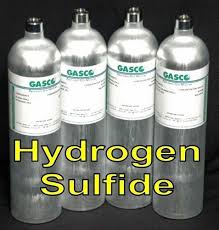Hydrogen Sulfide-Hazard and Toxicity
Sep 9,2019
Description
Hydrogen Sulfide is a colorless, very poisonous, flammable gas with the characteristic foul odor of rotten eggs. It often results from the bacterial breakdown of organic matter in the absence of oxygen, such as in swamps and sewers where anaerobic digestion can take place. It also occurs in volcanic gases, “natural gas”, and some well waters. Hydrogen sulfide has numerous names, some of which are archaic.

Toxicity Data
LC50 inhal (rat) 444 ppm (580 mg/m3)
LCLO inhal (human) 800 ppm (1110 mg/m3; 5 min)
PEL (OSHA) 20 ppm (ceiling) (28 mg/m3)
TLV-TWA (ACGIH) 10 ppm (14 mg/m3)
STEL (ACGIH) 15 ppm (21 mg/m3)
Major Hazards
Moderately toxic gas; inhalation of large concentrations can cause unconsciousness, respiratory paralysis, and death; highly flammable. Exposure to very high concentrations causes immediate death. Also death or permanent injury may occur after very short exposure to small quantities. It acts directly upon the nervous system resulting in paralysis of respiratory centers.
Toxicity
The acute toxicity of hydrogen sulfide by inhalation is moderate. A 5-min exposure to 800 ppm has resulted in death. Inhalation of 1000 to 2000 ppm may cause coma after a single breath. Exposure to lower concentrations may cause headache, dizziness, and upset stomach. Low concentrations of H2S (20 to 150 ppm) can cause eye irritation, which may be delayed in onset. Although the odor of hydrogen sulfide is detectable at very low concentrations, it rapidly causes olfactory fatigue at higher levels, and therefore is not considered to have adequate warning properties. Hydrogen sulfide has not been shown to be carcinogenic or to have reproductive or developmental effects in humans.
Flammability and Explosibility
Hydrogen sulfide is flammable in air in the range of 4.3 to 45.5% (NFPA rating = 4). Combustion products (sulfur oxides) are also toxic by inhalation. In the event of a hydrogen sulfide fire, stop the flow of gas if possible without risk of harmful exposure and let the fire burn itself out.
Reactivity and Incompatibility
Hydrogen sulfide is incompatible with strong oxidizers. It will attack many metals, forming sulfides. Liquid hydrogen sulfide will attack some forms of plastics, rubber, and coatings. H2S reacts violently with a variety of metal oxides, including the oxides of chromium, mercury, silver, lead, nickel, and iron.
Storage and Handling
In particular, cylinders of hydrogen sulfide should be stored and used in a continuously ventilated gas cabinet or fume hood. Local fire codes should be reviewed for limitations on quantity and storage requirements.
Accidents
In the event of a release of hydrogen sulfide, the area should be evacuated immediately. Use appropriate respiratory protection to rescue an affected individual. Remove exposed individual to an uncontaminated area, and seek immediate emergency help. Keep victim warm, quiet, and at rest; provide assisted respiration if breathing has stopped. In the event of skin contact, immediately wash with soap and water and remove contaminated clothing. In case of eye contact, promptly wash with copious amounts of water for 15 min (lifting upper and lower lids occasionally) and obtain medical attention.
To respond to a release, use appropriate protective equipment and clothing. Positive pressure air-supplied respiratory protection is required. Close cylinder valve and ventilate area. Remove cylinder to a fume hood or remote area if it cannot be shut off.
Disposal
Excess hydrogen sulfide should be returned to the manufacturer, according to your institution's waste disposal guidelines.
- Related articles
- Related Qustion
- The polarity of H2S and its uses Dec 21, 2023
Hydrogen sulfide is a colorless molecule with a chemical formula H2S. It is poisonous and has a foul odor like a rotten egg.
- How to form the Lewis structure and hybrid mode of H2S Nov 24, 2023
The Lewis structure of H2S consists of a central sulphur atom (S) and two external hydrogen atoms (H) at a 92.1° degree bond angle.
- Biological functions and Synthesis of Hydrogen sulfide Jun 24, 2022
Hydrogen sulfide is important in the regulation of many cellular processes and is strongly implicated in oxygen sensing.
Hydrofluoric acid (HF) is an aqueous solution of hydrogen fluoride gas. At room temperature, it appears as colorless transparent to light yellow smoke liquid with pungent odor. It has a specific gravity of 0.98 which is slightly lighter tha....
Sep 9,2019Inorganic chemistryIodine is widely distributed in nature and it exists in the form of compounds. There are traces of iodine in rocks, soil, water, flora and fauna and air. But in addition to seawater, the distribution of iodine in nature is very uneven. The....
Sep 9,2019Inorganic chemistryHydrogen Sulfide
7783-06-4You may like
- Chalcopyrite crystal
Apr 19, 2024
- Crystal Structure and Superconductivity of Vanadium Silicide
Apr 18, 2024
- Crystal Structure of Cadmium Oxide (CdO)
Apr 18, 2024
Hydrogen Sulfide manufacturers
- HYDROGEN SULFIDE
-

- $15.00 / 1KG
- 2021-08-11
- CAS:7783-06-4
- Min. Order: 1KG
- Purity: 99%+ HPLC
- Supply Ability: Monthly supply of 1 ton




